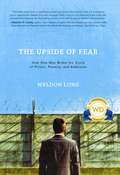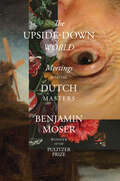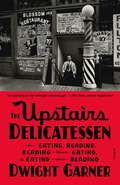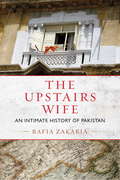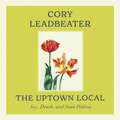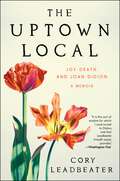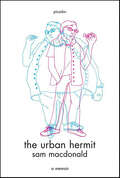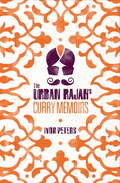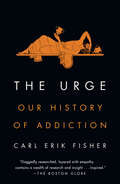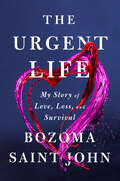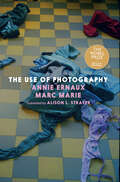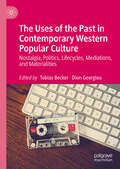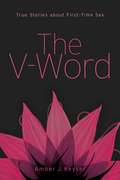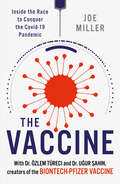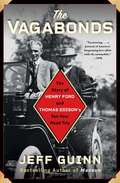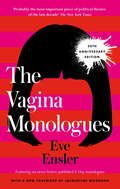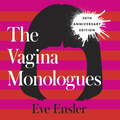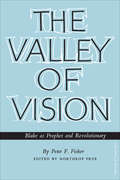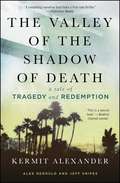- Table View
- List View
The Upside of Fear: How One Man Broke the Cycle of Prison, Poverty, and Addiction
by Weldon LongIn his gut-wrenching memoir of brutal crime, prison time, and ultimate redemption, author Weldon Long tells the true story of how he transformed himself from a drug-addled convict to the CEO of a multimillion-dollar business by discovering the upside of fear.
The Upside-Down World: Meetings with the Dutch Masters
by Benjamin MoserPlunged into a strange land at twenty-five, Benjamin Moser began an obsessive, decades-long study of the Dutch Masters to set his world right again. Arriving as a young writer in an ancient Dutch town, Benjamin Moser found himself visiting—casually at first, and then more and more obsessively—the country’s great museums. Inside these old buildings, he discovered the remains of the Dutch Golden Age and began to unearth the strange, inspiring, and terrifying stories of the artists who gave shape to one of the most luminous moments in the history of human creativity. Beyond the sainted Rembrandt—who harbored a startling darkness—and the mysterious Vermeer, whose true subject, it turned out, was lurking in plain sight, Moser got to know a whole galaxy of geniuses: the doomed virtuoso Carel Fabritius, the anguished wunderkind Jan Lievens, the deaf prodigy Hendrik Avercamp. And through their artwork, he got to know their country, too: from the translucent churches of Pieter Saenredam to Paulus Potter’s muddy barnyards, and from Pieter de Hooch’s cozy hearths to Jacob van Ruisdael’s tragic trees. Year after year, as he tried to make a life for himself in the Netherlands, Moser found friends among these centuries-dead artists. And he found that they, too, were struggling with the same questions that he was. Why do we make art? What even is art, anyway—and what is an artist? What does it mean to succeed as an artist, and what does it mean to fail? Is art a consolation—or a mortal danger? The Upside-Down World is an invitation to ask these questions, and to turn them on their heads: to look, and then to look again. This is Holland and its great artists as we’ve never seen them before. And it’s a sumptuously illustrated, highly personal coming-of-age-story, twenty years in the making: a revealing self-portrait by one of the most acclaimed writers of his generation.
The Upstairs Delicatessen: On Eating, Reading, Reading About Eating, and Eating While Reading
by Dwight GarnerGarner gathers a literary chorus to capture the joys of reading and eating in this comic, personal classic. Reading and eating, like Krazy and Ignatz, Sturm und Drang, prosciutto and melon, Simon and Schuster, and radishes and butter, have always, for me, simply gone together. The book you’re holding is a product of these combined gluttonies.Dwight Garner, the beloved New York Times critic and the author of Garner’s Quotations, serves up the intertwined pleasures of books and food. The product of a lifetime of obsessively reading, eating, and every combination therein, The Upstairs Delicatessen: On Eating, Reading, Reading About Eating, and Eating While Reading is a charming, emotional memoir, one that only Garner could write. In it, he records the voices of great writers and the stories from his life that fill his mind as he moves through the sections of the day and of this book: breakfast, lunch, shopping, the occasional nap, drinking, and dinner.Through his lifelong infatuation with these twin joys, we meet the man behind the pages and the plates, and a portrait of Garner, eager and insatiable, emerges. He writes with tenderness and humor about his mayonnaise-laden childhood in West Virginia and Naples, Florida (and about his father’s famous peanut butter and pickle sandwich), his mind-opening marriage to a chef from a foodie family (“Cree grew up taking leftover frog legs to school in her lunch box”), and the words and dishes closest to his heart. This is a book to be savored, though it may just whet your appetite for more.
The Upstairs Wife
by Rafia ZakariaA memoir of Karachi through the eyes of its women An Indies Introduce Debut Authors Selection For a brief moment on December 27, 2007, life came to a standstill in Pakistan. Benazir Bhutto, the country's former prime minister and the first woman ever to lead a Muslim country, had been assassinated at a political rally just outside Islamabad. Back in Karachi--Bhutto's birthplace and Pakistan's other great metropolis--Rafia Zakaria's family was suffering through a crisis of its own: her Uncle Sohail, the man who had brought shame upon the family, was near death. In that moment these twin catastrophes--one political and public, the other secret and intensely personal--briefly converged. Zakaria uses that moment to begin her intimate exploration of the country of her birth. Her Muslim-Indian family immigrated to Pakistan from Bombay in 1962, escaping the precarious state in which the Muslim population in India found itself following the Partition. For them, Pakistan represented enormous promise. And for some time, Zakaria's family prospered and the city prospered. But in the 1980s, Pakistan's military dictators began an Islamization campaign designed to legitimate their rule--a campaign that particularly affected women's freedom and safety. The political became personal when her aunt Amina's husband, Sohail, did the unthinkable and took a second wife, a humiliating and painful betrayal of kin and custom that shook the foundation of Zakaria's family but was permitted under the country's new laws. The young Rafia grows up in the shadow of Amina's shame and fury, while the world outside her home turns ever more chaotic and violent as the opportunities available to post-Partition immigrants are dramatically curtailed and terrorism sows its seeds in Karachi. Telling the parallel stories of Amina's polygamous marriage and Pakistan's hopes and betrayals, The Upstairs Wife is an intimate exploration of the disjunction between exalted dreams and complicated realities.From the Hardcover edition.
The Uptown Local: Joy, Death, and Joan Didion
by Cory LeadbeaterAs an aspiring novelist in his early twenties, Cory Leadbeater was presented with an opportunity to work for a well-known writer whose identity was kept confidential. Since the tumultuous days of childhood, Cory had sought refuge from the rougher parts of life in the pages of books. Suddenly, he found himself the personal assistant to a titan of literature: Joan Didion.In the nine years that followed, Cory shared Joan's rarefied world, transformed not only by her blazing intellect but by her generous friendship and mentorship. Together they recited poetry in the mornings, dined with Supreme Court justices, attended art openings, smoked a single cigarette before bed.But secretly, Cory was spiraling. He reeled from the death of a close friend. He spent his weekends at a federal prison, visiting his father as he served time for fraud. He struggled day after day to write the novel that would validate him as a real writer. And meanwhile, the forces of addiction and depression loomed large.In hypnotic prose that pulses with life and longing, The Uptown Local explores the fault lines of class, family, loss, and creativity. It is a love letter to a cultural icon-and a moving testament to the relationships that sustain us in the eternal pursuit of a life worth living.
The Uptown Local: Joy, Death, and Joan Didion
by Cory LeadbeaterAs an aspiring novelist in his early twenties, Cory Leadbeater was presented with an opportunity to work for a well-known writer whose identity was kept confidential. Since the tumultuous days of childhood, Cory had sought refuge from the rougher parts of life in the pages of books. Suddenly, he found himself the personal assistant to a titan of literature: Joan Didion.In the nine years that followed, Cory shared Joan's rarefied world, transformed not only by her blazing intellect but by her generous friendship and mentorship. Together they recited poetry in the mornings, dined with Supreme Court justices, attended art openings, smoked a single cigarette before bed.But secretly, Cory was spiraling. He reeled from the death of a close friend. He spent his weekends at a federal prison, visiting his father as he served time for fraud. He struggled day after day to write the novel that would validate him as a real writer. And meanwhile, the forces of addiction and depression loomed large.In hypnotic prose that pulses with life and longing, The Uptown Local explores the fault lines of class, family, loss, and creativity. It is a love letter to a cultural icon-and a moving testament to the relationships that sustain us in the eternal pursuit of a life worth living.
The Uptown Local: Joy, Death, and Joan Didion: A Memoir
by Cory LeadbeaterA brilliant debut memoir about a young writer—struggling with depression, family issues, and addiction—and his life-changing decade working for Joan DidionAs an aspiring novelist in his early twenties, Cory Leadbeater was presented with an opportunity to work for a well-known writer whose identity was kept confidential. Since the tumultuous days of childhood, Cory had sought refuge from the rougher parts of life in the pages of books. Suddenly, he found himself the personal assistant to a titan of literature: Joan Didion.In the nine years that followed, Cory shared Joan’s rarefied world, transformed not only by her blazing intellect but by her generous friendship and mentorship. Together they recited poetry in the mornings, dined with Supreme Court justices, attended art openings, smoked a single cigarette before bed.But secretly, Cory was spiraling. He reeled from the death of a close friend. He spent his weekends at a federal prison, visiting his father as he served time for fraud. He struggled day after day to write the novel that would validate him as a real writer. And meanwhile, the forces of addiction and depression loomed large.In hypnotic prose that pulses with life and longing, The Uptown Local explores the fault lines of class, family, loss, and creativity. It is a love letter to a cultural icon—and a moving testament to the relationships that sustain us in the eternal pursuit of a life worth living.
The Urban Hermit: A Memoir
by Sam MacdonaldFaced with the truth that his debts and his waistline had both ballooned out of control, Sam MacDonald devised a plan to change his life.When Sam graduated from Yale in 1995, he watched a classmate make inroads as a head-office guy in professional baseball, another become a day-trading millionaire, and another develop connections at the Playboy Mansion. Struggling to make ends meet, he shrugged his shoulders at their success and raised a tall one to them.It wasn't until April 2000 that Sam got his wake-up call. He weighed 340 lbs. He was flat broke. And the IRS had caught up with him.In a desperate attempt to save himself, Sam decided to limit himself to a budget of $8 a week and 800 calories a day. He called it "The Urban Hermit Plan."He thought he would do it for a month. Instead, he embarked on a bizarre year-long journey. He lost 160 pounds in the process, befriended rent-dodging trailer-park denizens, flew to Bosnia on assignment, traveled to a peace festival in a hippie van, had a run-in with Cooter from the Dukes of Hazzard, and met the woman who would later become his wife.The Urban Hermit is a wildly hilarious story about backwoods living, as told by a man who should have known better.
The Urban Rajah's Curry Memoirs
by Ivor PetersPlease note this has been optimised for display on tablets and colour devices.Bursting with delicious recipes and stunning illustrations, this is a food memoir like no other.Curry has become an integral part of our staple diet but few of us are aware of what 'authentic' means when it comes to Britain's favourite food - how it is cooked and what makes it so sublime. Instead we have been patronised with dumbed-down versions of wonderfully spiced dishes through the provision of gooey mixtures that slime their way out of jars. 'No more!' cries self-proclaimed Urban Rajah Ivor Peters. The search for homemade, straightforward fragrant food ends here. Packed full of inspiring stories and generations-old recipes, this book opens the door into a world of family cooking that will teach us how to cook delicious curry in our own homes. So put down that jar of low-fat chicken tikka masala, rip up your takeaway menu and let Ivor lead you through a journey of spice that will leave you revelling in colour, yearning for the delicate smells of cardamom and cinnamon and desperate to tear a chapatti to shreds and plunge it into a curry feast of your own making.
The Urge: Our History of Addiction
by Carl Erik FisherAn authoritative, illuminating, and deeply humane history of addiction—a phenomenon that remains baffling and deeply misunderstood despite having touched countless lives—by an addiction psychiatrist striving to understand his own family and himselfEven after a decades-long opioid overdose crisis, intense controversy still rages over the fundamental nature of addiction and the best way to treat it. With uncommon empathy and erudition, Carl Erik Fisher draws on his own experience as a clinician, researcher, and alcoholic in recovery as he traces the history of a phenomenon that, centuries on, we hardly appear closer to understanding—let alone addressing effectively. As a psychiatrist-in-training fresh from medical school, Fisher was soon face-to-face with his own addiction crisis, one that nearly cost him everything. Desperate to make sense of the condition that had plagued his family for generations, he turned to the history of addiction, learning that the current quagmire is only the latest iteration of a centuries-old story: humans have struggled to define, treat, and control addictive behavior for most of recorded history, including well before the advent of modern science and medicine. A rich, sweeping history that probes not only medicine and science but also literature, religion, philosophy, and sociology, The Urge illuminates the extent to which the story of addiction has persistently reflected broader questions of what it means to be human and care for one another. Fisher introduces us to the people who have endeavored to address this complex condition through the ages: physicians and politicians, activists and artists, researchers and writers, and of course the legions of people who have struggled with their own addictions. He also examines the treatments and strategies that have produced hope and relief for many people with addiction, himself included. Only by reckoning with our history of addiction, he argues—our successes and our failures—can we light the way forward for those whose lives remain threatened by its hold. The Urge is at once an eye-opening history of ideas, a riveting personal story of addiction and recovery, and a clinician&’s urgent call for a more expansive, nuanced, and compassionate view of one of society&’s most intractable challenges.
The Urgent Life: My Story of Love, Loss, and Survival
by Bozoma Saint John"The Urgent Life shines a bright light on the intricacies of the shadows she&’s been in, and illuminates the beauty of her urgent life.&” —Serena WilliamsFrom iconic leader Bozoma Saint John, comes a memoir of grief, and one woman's drive to thrive in the face of lossWhen Bozoma Saint John's husband, Peter, died of cancer, she made one big decision: to live life urgently. Bozoma was no stranger to adversity, having lost her college boyfriend to suicide, navigated an interracial marriage, grieved a child born prematurely--a process that led to her and Peter's separation--and coparented the daughter who she and Peter shared. When Peter knew his cancer was terminal, he gave Bozoma a short list of things to do: cancel the divorce, and fix the wrongs immediately. In The Urgent Life, Bozoma takes readers through the dizzying, numbing days of multiple griefs, and the courage which these sparked in her to live life in accordance with her deepest values time and time again. We witness Bozoma's journey forward through the highs and the lows, as she negotiates life as a woman determined to learn from tragedies to build a remarkable life worth living even in her brokenness.Bozoma's story is extraordinary, but her grief is not uncommon, and her courage is sure to touch any reader who has loved, mourned and is finding a path through loss and grief, as well as anyone who is maneuvering a pivot and wants to live life to its fullest.
The Usborne Internet-Linked Medieval World
by Jane BinghamFrom the big battles to kings & warriors, from peasants to palaces, this lavishly illustrated book is crammed with essential information about the medieval world. Follow the Crusades to the Holy Land, explore China with Parco Polo & visit a Mayan ball game. Find out how a knight trained for battle who invented fireworks & who the Vandals were.
The Use of Photography
by Annie Ernaux Marc MarieWINNER OF THE 2022 NOBEL PRIZE IN LITERATURE**Serialized in The New Yorker**An account of Annie Ernaux&’s love affair with journalist Marc Marie while she was undergoing treatment for cancer, and their combined project to document images and memories.Includes 14 color still-life photographs by the authors.A LitHub Most Anticipated Book of 2024&“A must-read for lovers of words, images, and Ernaux herself. So. . . everyone?&”—Jessie Gaynor, LitHub&“Annie Ernaux has long foregrounded physical and emotional sensations as the building blocks of her autobiographical writing. However, it is in The Use of Photography where the connection between the body and subjectivity most powerfully emerges.&”—Lisa Connell in French Forum&“These photos, in which the bodies are absent, and the eroticism is only represented by the abandoned clothes, were a reminder of my possible, permanent absence.&”—Annie ErnauxAnnie Ernaux and Marc Marie met in January 2003 and became lovers almost immediately. A short time later, he accompanied her to the Institut Curie, where she was having surgery for breast cancer. A deep bond formed between Annie and Marc precisely during this time of great uncertainty within Ernaux as to whether she would live or die from the cancer.Early in their affair, Ernaux found herself entranced each morning by the sight of clothes strewn about, chairs out of place, and the remains of their last meal of the evening before still on the table. The two lovers began to take still life photographs, and to write. Their efforts to save the fleeting beauty of these moments were, as Ernaux would describe later in an interview, &“material proof of what had happened there, of love.&”The Use of Photography is a defining work in Ernaux&’s career, leading directly to the book that would come next, her masterpiece, The Years.&“Annie Ernaux&’s work presents a breathtakingly frank, fearless, many-sided account of the female experience during the past century.&”—Liesl Schillinger, Oprah Daily
The Uses of the Past in Contemporary Western Popular Culture: Nostalgia, Politics, Lifecycles, Mediations, and Materialities
by Tobias Becker Dion GeorgiouThis book takes an interdisciplinary approach to understanding the different ways in which the past remains present in Western popular culture in the twenty-first century. It combines theoretical analyses with case study-based chapters focusing on examples from Britain, the US, and Germany, among other countries. In doing so, it pushes beyond a simplistic and monolithic conception of what ‘nostalgia’ is to allow for a more nuanced and varied conceptualisation of this phenomenon, and to also incorporate other ways of understanding the invoking or inclusion of different histories within cultural objects, formats, and practices.
The V-Word
by Amber J. KeyserAn honest and poignant collection of essays by women about losing their virginity in their teens. The V-Word captures the complexity of this important life-decision and reflects diverse real-world experiences. Includes helpful resources for parents and teens.Losing it. Popping your cherry. Handing in your V-card. First time sex is a big unknown. Will it be candlelight and rose petals or quick and uncomfortable? Is it about love or about lust? Deciding to have sex for the first time is a choice that's often fraught with anxiety and joy. But do you have anyone telling you what sex is really like? In The V-Word seventeen writers (including Christa Desir, Justina Ireland, Sara Ryan, Carrie Mesrobian, Erica Lorraine Scheidt, and Jamia Wilson) pull back the sheets and tell all, covering everything from straight sex to queer sex, diving-in versus waiting, and even the exhilaration and disappointment that blankets it all. Some of their experiences happened too soon, some at just the right time, but all paint a broad picture of what first-time sex is really like. Funny, hot, meaningful, cringe-worthy, gross, forgettable, magnificent, empowering, and transformative, the stories in The V-Word are never preachy, but provide a map for teens to chart their own course through the steamy waters of sex. With The V-Word girls can finally take control, learn what's on the horizon, and eliminate the fear and mystery surrounding this important milestone.
The Vaccine: Inside the Race to Conquer the COVID-19 Pandemic
by Joe Miller Özlem Türeci Ugur SahinWinners of the Paul Ehrlich PrizeThe dramatic story of the married scientists who founded BioNTech and developed the first vaccine against COVID-19.Nobody thought it was possible. In mid-January 2020, Ugur Sahin told Özlem Türeci, his wife and decades-long research partner, that a vaccine against what would soon be known as COVID-19 could be developed and safely injected into the arms of millions before the end of the year. His confidence was built upon almost thirty years of research. While working to revolutionize the way that cancerous tumors are treated, the couple had explored a volatile and overlooked molecule called messenger RNA; they believed it could be harnessed to redirect the immune system's forces against any number of diseases. As the founders of BioNTech, they faced widespread skepticism from the scientific community at first; but by the time Sars-Cov-2 was discovered in Wuhan, China, BioNTech was prepared to deploy cutting edge technology and create the world’s first clinically approved inoculation for the coronavirus.The Vaccine draws back the curtain on one of the most important medical breakthroughs of our age; it will reveal how Doctors Sahin and Türeci were able to develop twenty vaccine candidates within weeks, convince Big Pharma to support their ambitious project, navigate political interference from the Trump administration and the European Union, and provide more than three billion doses of the Pfizer/BioNTech vaccine to countries around the world in record time.Written by Joe Miller—the Financial Times’ Frankfurt correspondent who covered BioNTech’s COVID-19 project in real time—with contributions from Sahin and Türeci, as well as interviews with more than sixty scientists, politicians, public health officials, and BioNTech staff, the book covers key events throughout the extraordinary year, as well as exploring the scientific, economic, and personal background of each medical innovation. Crafted to be both completely accessible to the average reader and filled with details that will fascinate seasoned microbiologists, The Vaccine explains the science behind the breakthrough, at a time when public confidence in vaccine safety and efficacy is crucial to bringing an end to this pandemic.
The Vaccine: Inside the Race to Conquer the COVID-19 Pandemic
by Joe Miller Ugur SahinWhen the world stopped, all hopes rested on finding a vaccine. An unlikely team answered the call. Before Covid-19 was even given its name, a select group of scientists in Germany, assembled by married couple and decades-long research partners Ugur Sahin and Özlem Türeci, began building 20 potential vaccines.As the deadly disease spread from country to country, what followed was a desperate race against time to conduct rigorous tests and clinical trials, whilst navigating political interference and seeking the support of the pharmaceutical industry.Shedding a light on the science behind the breakthrough, The Vaccine tells the story of the trailblazers who led the fightback against Covid-19, whose discoveries could now help the world tackle cancer, along with many other pervasive diseases. It draws back the curtain on one of the most important medical achievements of our age, containing contributions from the fascinating couple themselves, as well as more than 60 scientists, politicians, public health officials, and BioNTech staff.More suspenseful than a novel, this is a real-life story of an extraordinary race against time to save the world.
The Vagabonds: The Story of Henry Ford and Thomas Edison's Ten-Year Road Trip
by Jeff GuinnA &“fascinating slice of rarely considered American history&” (Booklist)—the story of Henry Ford and Thomas Edison—whose annual summer sojourns introduced the road trip to our culture and made the automobile an essential part of modern life.In 1914 Henry Ford and naturalist John Burroughs visited Thomas Edison in Florida and toured the Everglades. The following year Ford, Edison, and tire maker Harvey Firestone joined together on a summer camping trip and decided to call themselves the Vagabonds. They would continue their summer road trips until 1925, when they announced that their fame made it too difficult for them to carry on. Although the Vagabonds traveled with an entourage of chefs, butlers, and others, this elite fraternity also had a serious purpose: to examine the conditions of America&’s roadways and improve the practicality of automobile travel. Cars were unreliable and the roads were even worse. But newspaper coverage of these trips was extensive, and as cars and roads improved, the summer trip by automobile soon became a desired element of American life. The Vagabonds is &“a portrait of America&’s burgeoning love affair with the automobile&” (NPR) but it also sheds light on the important relationship between the older Edison and the younger Ford, who once worked for the famous inventor. The road trips made the automobile ubiquitous and magnified Ford&’s reputation, even as Edison&’s diminished. The automobile would transform the American landscape, the American economy, and the American way of life and Guinn brings this seminal moment in history to vivid life.
The Vagina Monologues
by Eve Ensler2018 marks the twentieth anniversary of V-Day, the radical grassroots movement to end violence against women and girls, inspired by Eve Ensler's international sensation The Vagina Monologues. This special edition features six never-before-published monologues, a new foreword by National Book Award winner Jacqueline Woodson, a new introduction by the author, and a new afterword by One Billion Rising director Monique Wilson on the stage phenomenon's global impact.A landmark work in women's empowerment, as relevant as ever after a year marked by unprecedented social and political protest in the face of unapologetic racism and misogyny, The Vagina Monologues honours women's sexuality in all its complexity, mystery and power. Witty and irreverent, compassionate and wise, this award-winning masterpiece gives voice to real women's deepest fantasies, fears, anger and pleasure, and calls for a world where all women are safe, equal, free and alive in their bodies.'This play changed the world. Seeing it changed my soul. Performing in it changed my life'Kerry Washington
The Vagina Monologues
by Eve EnslerI decided to talk to women about their vaginas, to do vagina interviews, which became vagina monologues ... At first women were reluctant to talk. They were a little shy. But once they got going, you couldn't stop them. Women secretly love to talk about their vaginas. They get very excited, mainly because no one's ever asked them before.' Eve Ensler A poignant and hilarious tour of the last frontier, the ultimate forbidden zone, THE VAGINA MONOLOGUES is a celebration of female sexuality in all its complexity and mystery. Hailed as the bible for a new generation of women, it has been performed in cities and colleges throughout the world, and has inspired a dynamic grassroots movement -- V-Day -- to stop violence against women. Read here by the author herself, it is witty and irreverent, compassionate and wise, and Eve Ensler's award-winning masterpiece gives voice to real women's deepest fantasies and fears, guaranteeing that no one who listens to it will ever look at a woman's body, or think of sex, in quite the same way again.
The Valedictorian of Being Dead: The True Story of Dying Ten Times to Live
by Heather B. ArmstrongFrom New York Times bestselling author and blogger Heather B. Armstrong comes an honest and irreverent memoir—reminiscent of the New York Times bestseller Brain on Fire—about her experience as one of only a few people to participate in an experimental treatment for depression involving ten rounds of a chemically induced coma approximating brain death.For years, Heather B. Armstrong has alluded to her struggle with depression on her website, dooce. It’s scattered throughout her archive, where it weaves its way through posts about pop culture, music, and motherhood. But in 2016, Heather found herself in the depths of a depression she just couldn’t shake, an episode darker and longer than anything she had previously experienced. She had never felt so discouraged by the thought of waking up in the morning, and it threatened to destroy her life. So, for the sake of herself and her family, Heather decided to risk it all by participating in an experimental clinical trial involving a chemically induced coma approximating brain death. Now, for the first time, Heather recalls the torturous eighteen months of suicidal depression she endured and the month-long experimental study in which doctors used propofol anesthesia to quiet all brain activity for a full fifteen minutes before bringing her back from a flatline. Ten times. The experience wasn’t easy. Not for Heather or her family. But a switch was flipped, and Heather hasn’t experienced a single moment of suicidal depression since. Disarmingly honest, self-deprecating, and scientifically fascinating, The Valedictorian of Being Dead brings to light a groundbreaking new treatment for depression.
The Valley of Heart's Delight: True Tales from Around the Bay (American Chronicles)
by Robin ChapmanThe Santa Clara Valley, with its rich soil and sunny weather, has been home to great diversity and great innovation long before it became known as Silicon Valley.California's first immigrants from Mexico were astonished by its beauty. "The land is moist and the hills have an abundance of rosemary and herbs, sunflowers in bloom, vines as plentiful as a vineyard," wrote one. From the movie stars of Hollywood's golden era who once came to play to billionaires who grew apricots for pleasure, the valley has hosted orchards, electric railroads, Army camps and even a love-struck poet. Join author and historian Robin Chapman as she uncovers the true tales of this ever-changing place.
The Valley of Vision: Blake as Prophet and Revolutionary (University of Toronto Department of English Studies and Texts #9)
by Northrop Frye Peter FisherThe author of this important contribution to the study of Blake was tragically drowned in a sailing accident when he had almost completed it in manuscript. His was a critical mind of singular erudition and power. As is abundantly evidenced in these chapters which Northrop Frye has prepared for publication. Fisher had made a careful study of Oriental philosophy and of Plato and the Neo-Platonists and this background enabled him to make an original and fruitful analysis of his central interest, Blake. The book is not a study of Blake's sources but of his context. The author is trying to answer the question: given Blake's general point of view, why does he make the specific judgments he does make, judgments which so often seem merely glib or petulant or perverse. Blake himself, in explaining a painting, remarked: "It ought to be understood that the Persons, Moses & Abraham, are not here meant, but the States Signified by those Names." Fisher explains what Blake meant by "states," and shows that such names as Plato, Bacon or Newton, or such terms as "priest" or "deist" in Blake's writings, refer not to individuals but to cultural forces in Western civilization, the influence of which accounted for the social conditions that Blake attacked. The attack itself, Fisher shows, was based on a revolutionary dialectic, a sense of the underlying opposition between reactionaries committed to obscurantism and social injustice, the "Elect" as Blake calls them, and the prophets committed to a greater vision (the "Reprobate"), with the mass of the public (the "Redeemed") in between.
The Valley of the Shadow of Death
by Jeff Snipes Kermit Alexander Alex GerouldIn this heart-wrenching memoir, former NFL star Kermit Alexander tells the devastating true story of the horrific massacre of his family and his subsequent years of despair, followed by a spiritual renewal that showed him a way to rebuild his family and reclaim his life.On the morning of August 31, 1984, in the South Central section of Los Angeles, three armed men broke into a house, brutally murdering two women and two young boys. The victims were Ebora Alexander, Dietra Alexander, Damani Garner, and Damon Bonner--the mother, sister, and nephews of retired All-Pro cornerback for the San Francisco 49ers Kermit Alexander. In his own words, Kermit Alexander finally shares the full story of what happened to his loved ones and the aftermath of that tragic day. He recounts the hours leading up to the massacre, and how afterward he lost himself in the LA underworld, pleading, bribing, and threatening in a search for answers. He describes his journey through the "wilderness" of despair--the years of isolation living out of his car, broke, depressed, and sick. We also learn about his coming-of-age in 1950s LA, the following decade he spent in the NFL, the events leading up to that fateful August day, and finally the shocking truth behind the murders. Kermit opens up about his darkest hours, but also what it took to turn his life around, rebuild his family, and ultimately find peace. Ominous and intense, powerful and uplifting, tragic and triumphant, The Valley of the Shadow of Death is more than a rendering of one man's adversity; it's testament to the value of family and the resilience of the human spirit in the face of overwhelming loss.
The Value of Emily Dickinson
by Mary LoeffelholzThe Value of Emily Dickinson is the first compact introduction to Dickinson to focus primarily on her poems and why they have held and continue to hold such significance for readers. It addresses the question of literary value in light of current controversies dividing scholars, including those surrounding the critical issue of whether her writings are best appreciated as visual works of manuscript art or as rhymed and metered poems intended for the inner ear. Mary Loeffelholz deftly incorporates Dickinson's distinctive biography and her historical, religious, and cultural contexts into close readings, tracing the evolution of Dickinson's style. This volume - which considers not only the complex history of Dickinson's poems in print, but also their future in digital formats - will be an invaluable resource for undergraduate and graduate students seeking to better understand the importance of this seminal American poet.
